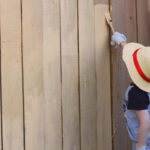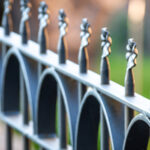Are you one of the many people who enjoy spending time outdoors in your backyard, but have been troubled by deer coming into your yard and eating your plants? If so, you are not alone. Deer can be a big problem for gardeners and homeowners alike, as they will eat anything and everything in sight. While there are some methods of dealing with deer that don’t involve fencing them out, such as using repellents or scare tactics, installing a fence is often the most effective solution.
When it comes to choosing a fence for keeping deer out of your yard, there are a few things you’ll want to keep in mind. First and foremost, you need to choose the right material. While some people try using chicken wire or other types of cheaply made fencing materials, this is not a good idea. Deer can easily push through these materials, leaving you with little improvement in your situation. Instead, look for fences made from quality materials that are specifically designed to deter deer from coming into your yard.
Another important thing to consider when choosing fences for deer is how tall they should be and where exactly you should install them. Generally speaking, it is best if the fence extends at least four feet above ground level — this will help keep deer from jumping over the fence. If you have particularly ambitious deer or a lot of land to cover, adding another foot of height may be necessary. You should also install your fences in areas where deer are likely to come into your yard — near gardens, fruit trees, and other potentially tasty plants.
If you’re having trouble finding a fencing solution that works well for keeping out deer, ask around or do some online research. There are many companies that specialize in high-quality fencing materials designed specifically for deterring deer — it just takes a bit of searching to find one that meets your needs. By investing in good-quality fencing materials and putting them up at the right spots around your yard, it is possible to keep deer out of your yard and away from your important plants.
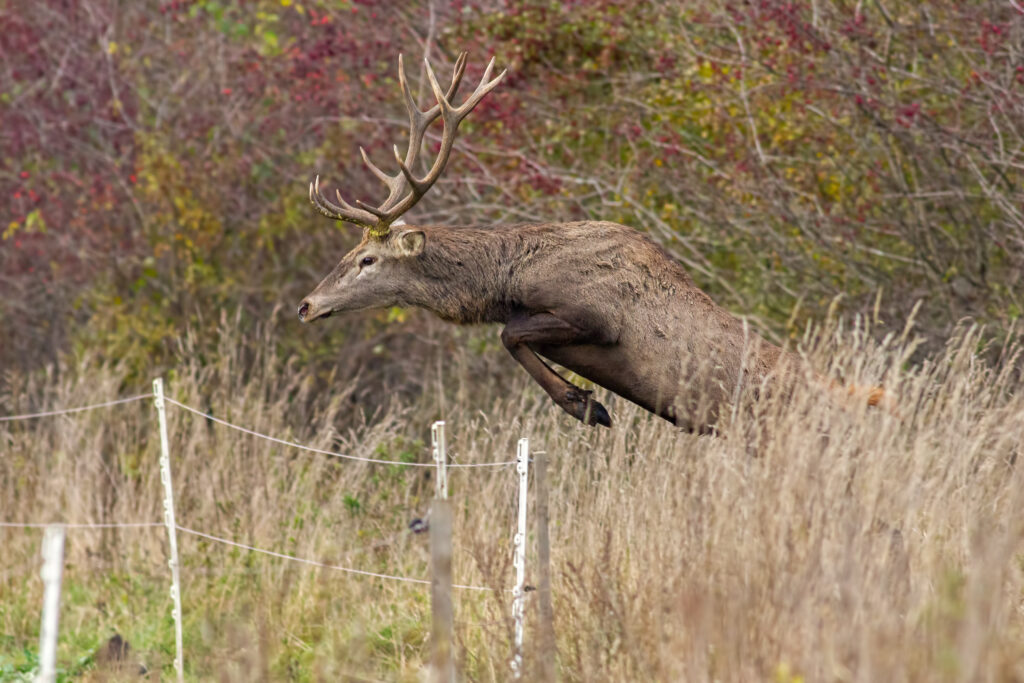
Things To Consider For A Deer Fence
Deer fence height: The height of the deer fence is an important consideration for anyone who is looking to protect their property from deer damage. The height of the fence will determine how effective it is at keeping deer out. A taller fence will be more difficult for deer to jump over, and it will also provide a physical barrier that deer are less likely to try to go through. In general, a deer fence should be at least 8 feet tall, but 10 or 12 feet is even better. If you live in an area with particularly large or aggressive deer, you may even need to go up to 15 or 20 feet. Whatever height you choose, make sure that the fence is solidly built and installed so that deer cannot find a way to get around it.
Deer fence slack: A slack in a deer fence is essential to the structure’s integrity. The tension on the fence needs to be released periodically to prevent the fence from becoming too brittle and breaking. Slack also allows the deer to move freely without being constricted by the fence. If you find that your deer fence has developed a slack, you can tighten it by adding more support posts or by tightening the guy wires. You can also add a wire mesh to the bottom of the fence to help prevent animals from digging underneath it and creating a slack. By taking these steps, you can ensure that your deer fence will continue to protect your property from unwanted visitors.
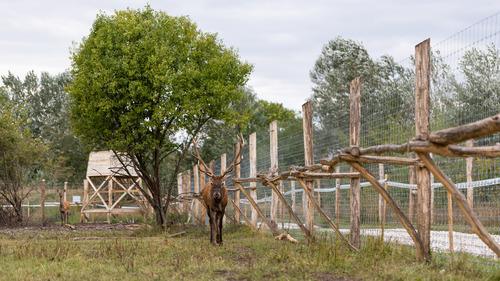
Types Of Deer Fence To Install
Metal Wire Fencing
When it comes to deer fencing, there are a lot of different options on the market. You can go with traditional wood fencing, or you can go with metal wire deer fencing. There are pros and cons to both options, but in the end, metal wire deer fencing is often the better choice. Here’s why:
1) Metal wire deer fencing is stronger than wood fences. It can withstand the force of a charging deer, whereas a wooden fence might not.
2) Metal wire deer fencing is more durable than wood fences. It will last for many years without rotting or warping like wood fences will.
3) Metal wire deer fencing is less likely to be damaged by weather conditions than wood fences. Hail, wind, and rain will not damage metal wire as easily as they will wood.
4) Metal wire deer fencing is less expensive than wooden fences in the long run. While a wooden fence may cost less initially, it will have to be replaced much more often than a metal fence will.
Pros & Cons Of Metal Wire Fencing:
Pros:
1. Low cost – wire deer fencing is one of the most affordable types of deer fencing available.
2. Easy installation – wire deer fencing can be installed quickly and easily by almost anyone.
3. Effective at keeping deer out – wire deer fencing is highly effective at preventing deer from entering gardens and yards.
Cons:
1. May not be as aesthetically pleasing as other types of deer fencing – wire deer fencing is not as decorative as some of the other options available, such as wooden or plastic fencing.
2. Can be prone to damage – wire deer fencing can be damaged easily if it is not properly installed or maintained.
Polypropylene Mesh Fencing
Polypropylene mesh deer fencing is an increasingly popular choice for deer control. It offers a number of advantages over traditional fencing materials like wood or metal. Let’s take a closer look at some of the benefits of polypropylene mesh deer fencing:
First, polypropylene mesh is very strong and durable. It can stand up to even the most determined deer. Second, polypropylene mesh is flexible and can be easily adapted to fit any terrain. This makes it ideal for uneven or heavily forested areas where other types of fencing would be difficult or impossible to use.
Third, polypropylene mesh is lightweight and easy to install. You can set it up yourself in just a few minutes with no special tools required. Fourth, polypropylene mesh is affordable and cost-effective. It costs less than traditional fencing materials while providing equivalent protection against deer damage. Finally, polypropylene mesh is environmentally friendly and recyclable. When you’re done with it, you can simply recycle the material instead of throwing it away.”
Pros & Cons Of Polypropylene Mesh Fencing
Pros:
1. It’s affordable – polypropylene mesh fencing is one of the more affordable types of fencing on the market.
2. It’s durable – polypropylene mesh fencing is highly durable and can withstand a lot of wear and tear.
Cons:
1. One potential downside is that it can be susceptible to wind damage & damage from wildlife, so it’s important to install it properly and make sure it’s securely attached to your property.
2. Polypropylene mesh fencing can be quite unsightly, so if aesthetics are important to you, you may want to consider another type of fence.
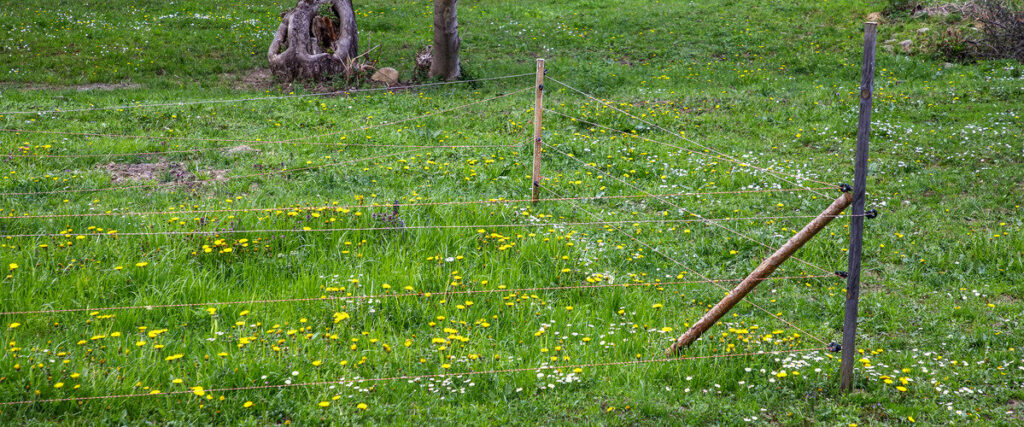
Electric Fencing
Electric deer fencing is an increasingly popular way to keep deer out of gardens and yards. It’s also a great way to protect crops from being eaten by deer. There are a few different types of electric fence systems available, so it’s important to choose the one that will work best for your needs.
There are three main types of electric fence systems: low-impedance, high-impedance, and polytape. Low-impedance fences are the most common type, and they’re best for keeping deer out of small areas like gardens or yards. High-impedance fences are better for larger areas like farms, since they provide more coverage. Polytape fences are less common, but they’re very effective at keeping deer away from crops.
Each type of electric fence system has its own benefits and drawbacks, so it’s important to choose the one that will work best for your specific situation. For example, if you live in a rural area with lots of open space, a high-impedance fence might be the best option. If you’re trying to protect a small garden in the city, a low-impedance fence would be a better choice.
Pros & Cons Of Electric Fencing
Pros:
1. It is effective at keeping deer out of gardens and yards.
2. It is relatively cheap to install.
3. It is easy to use and maintain.
Cons:
1. It can be dangerous if not used correctly.
2. It can be expensive to repair or replace if damaged.
3. It may not be effective in areas with high deer populations.
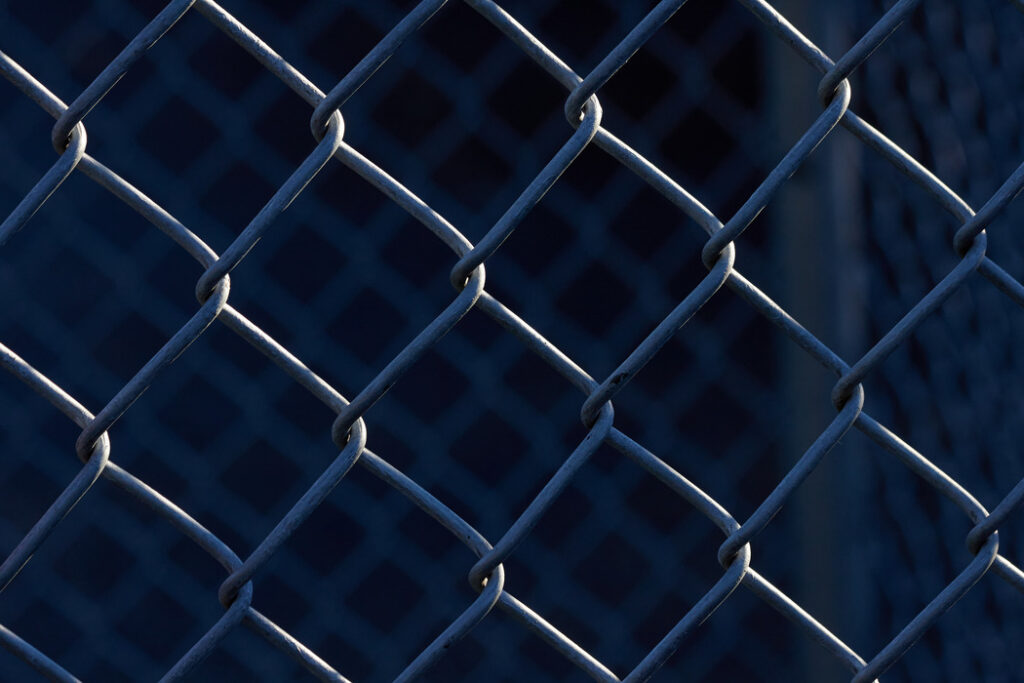
Chain Link Fence
Chain-link deer fence is a type of fencing that is made up of metal wires twisted into a mesh. It is used to keep deer out of gardens and other areas where they are not wanted. The fence can be installed as a permanent or temporary fixture, and it comes in several different heights to accommodate different needs. Chain-link deer fence is designed to be aesthetically appealing, so it blends in well with its surroundings.
There are several different materials available for chain-link deer fence, including galvanized steel and vinyl. Galvanized steel is the most durable option, as it is resistant to weathering and rusting. It can last for many years with proper maintenance. Vinyl fencing tends to be more affordable than metal options, but it does not hold up as well over time.
Pros & Cons Of Chain Link Fence
1. Chain link deer fences are affordable and easy to install.
2. They are less visible than traditional wooden fences, which can be an advantage if you want to keep your property discreet.
3. Deer cannot jump over them, so they provide a good level of security against deer intrusion.
4. They can also be used to contain other animals, such as dogs or cats.
Cons of chain link deer fence:
1. Chain link fences can be unsightly and disruptive to the aesthetics of your property.
2. They can also be noisy and rattled in the wind.
3. If not installed properly, they may not be effective in keeping deer out.
Solid Wood Privacy Fence
A solid wood privacy deer fence can be a beautiful and functional addition to your home. Not only will it keep deer out of your yard, but it can also provide you with privacy and security. Solid wood privacy fences are a popular choice for homeowners because they offer some of the best protection from deer. This type of fence is constructed by attaching boards or panels of solid wood to wooden posts. There are several different types of solid wood privacy fences available, including board-on-board and shadowbox.
Board-on-board fences have tightly spaced boards that provide great protection against deer. Shadowbox fences feature alternating sections of solid wood and spaces, providing an attractive aesthetic as well as good protection from deer.
Pros & Cons Of Solid Wood Privacy Fence
Pros:
1) Privacy: A solid wood privacy deer fence will provide you with complete privacy from your neighbors. This is a great option if you don’t want people to be able to see into your yard or if you have children who need privacy from the outside world.
2) Aesthetics: A solid wood privacy deer fence can add significant curb appeal to your home. It can also help define your property boundaries and create a sense of security and stability.
Cons:
1) Cost: A solid wood privacy deer fence can be more expensive than other types of fences. However, the added benefits may be worth the investment.
2) Maintenance: A solid wood privacy deer fence requires regular maintenance in order to keep it looking its best. This includes staining, painting, or sealing the wood every few years. If you’re not willing to commit to this level of maintenance, then another type of fence may be a better option for you.

Conclusion
If you’re considering a deer fence for your property, there are several things to take into consideration. The type of fencing you choose will depend on the size and layout of your property, as well as your budget. Metal wire fencing, polypropylene mesh fencing, electric fencing, chain link fence, or solid wood privacy fence are all effective options that will keep deer out – it just depends on what will work best for you. Do some research and talk to experts in order to make the best decision for your home or business.


